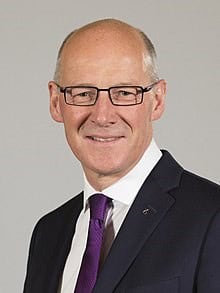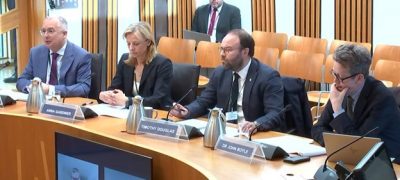Holyrood’s period of political instability has negatively impacted Scotland’s housing market, Propertymark has argued.
The Scottish Government survived a vote of no confidence on Wednesday 1 May, which was pushed forward by Scottish Labour following the resignation of Humza Yousaf as Scotland’s First Minister.
Mr Yousaf resigned his post following the Scottish Greens’ removal from their coalition with the Scottish National Party as part of the 2021 Bute House Agreement, which was forged on commitments to ‘implement an effective national system of rent controls’.
But the co-leader of the Scottish Greens, Patrick Harvie, resigned his government role as Minister for Zero Carbon Buildings, Active Travel and Tenants’ Rights following Mr Yousaf’s decision to tear up the Bute House Agreement due to disagreements over the Scottish Government’s target to cut Scotland’s carbon emissions by 75 per cent by 2030.
John Swinney, former deputy first minister and leader of the Scottish National Party between 2000-2004, put his name forward to succeed Mr Yousaf on Thursday 2 May, with Kate Forbes, the former first minister’s renowned rival for the leadership role in 2023, ruling herself out of this year’s bid to succeed him.
After Swinney’s rivals such as Kate Forbes and Graeme McCormick dropped out the leadership race, Swinney was appointed as leader of the Scottish National Party on 6 May, and then sworn in as First Minister on 7 May.
However, the appointment of Mr Swinney as First Minister has not led to any instant improvements regarding Scotland’s housing sector. Social Justice Secretary Shirley-Anne Somerville declared a housing emergency during a Labour-led debate, blaming Brexit and ‘Tory cuts’ for the choice.
Swinney justified the decision by saying he wanted to work with other parties to ‘recognise the significance of the challenge that exists’, and he avoided what could have been a difficult moment in parliament.
The Social Secretary added that she wanted to work with Westminster and local authorities to end the country’s housing problems and reverse cuts to Holyrood’s housing budget.
Despite having housing in the title, the bill won’t increase supply
Prior to Mr Yousaf’s resignation, the Scottish Government’s Housing (Scotland) Bill was introduced to the Scottish Parliament in March 2024, which is intended to enable local authorities to have the power to enact rent controls through submitting regular data and reports on rent levels in their area. However, many letting agents across Scotland will be left thinking that the roll-out and enforcement of the legislation will be difficult and inconsistent considering existing financial pressures on local authorities and the recent £200m budget cut.
Fundamentally, rents can only be reduced sustainably by increasing the overall supply of all types of homes, so that more people can get a social home or buy their own with a mortgage, and fewer private renters have to compete over each available home.
Commenting, Timothy Douglas, Head of Policy and Campaigns at Propertymark, said:
“Despite having housing in the title, the Housing (Scotland) Bill doesn’t include anything that will increase the supply of homes across Scotland and is unlikely to resolve Scotland’s housing crises. Furthermore, the policy work leading up to the legislation through the New Deal for Tenants talked about affordable rents, supply of rented homes and quality raising standards, but the legislation doesn’t address these issues and only offers rent control as the solution for affordability.”
Propertymark’s Head of Policy and Campaigns will be giving evidence in June to the Scottish Parliament’s Local Government, Housing & Planning Committee as part of their evidence sessions on the Housing (Scotland) Bill.











